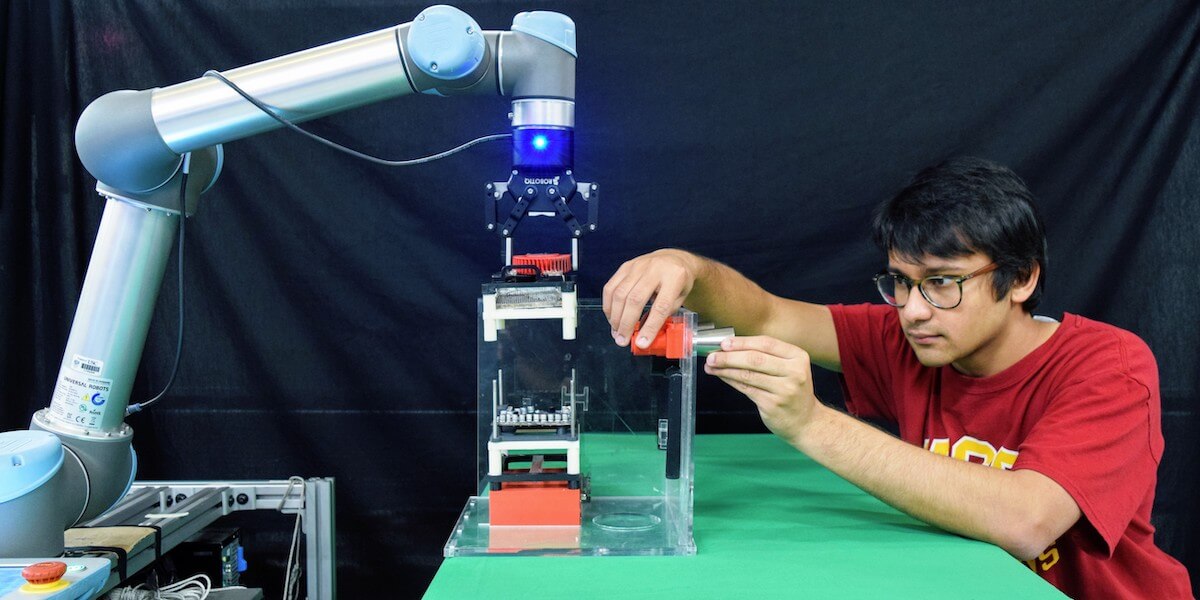
A human and a robot collaborating to perform a challenging assembly operation. This image features Prahar Bhatt, a graduate student at USC Viterbi School of Engineering, and a mobile manipulator developed by the Center for Advanced Manufacturing at USC. PHOTO/ARIYAN KABIR.
In response to a critically expanding need for employees with specialized STEM skills and knowledge, the National Science Foundation has awarded USC Viterbi School of Engineering $2 million to develop advanced manufacturing curriculum, revolutionizing education in this sector to advance the U.S. workforce. The USC Center for Advanced Manufacturing (CAM) has been leading the charge in bringing new, innovative solutions to the industry and will be a partner in developing related curricula.
According to a study conducted by Deloitte and The Manufacturing Institute, by 2025, an estimated 3.5 million jobs will be created in the manufacturing industry, however, due to gaps in skilled labor, an estimated two million of these—over 70 percent—are expected to go unfulfilled. USC Viterbi Professors, including SK Gupta, who is also the director of CAM, Yong Chen, Qiang Huang, Sven Koenig, Azad Madni and Gisele Ragusa form the team leading this project entitled, “Development of Modular, Scalable, and Extensible Advanced Manufacturing Curriculum Based on Systems Engineering Concepts.” Together they will design, develop and deploy curricula that combines simulation-based and telepresence-based experiments to improve comprehension and retention of online lessons.
This award is a part of the NSF’s Production Engineering Education and Research (PEER) program, funded by the Boeing Corporation. PEER aims to create and study open-source learning platforms to train and re-skill workers in fields ranging from engineering to manufacturing. A rigorous online skills training platform like USC Viterbi’s that is scalable and specific could accelerate training of 1000s of future and existing employees in this sector.
Advanced manufacturing is a key source of growth in the U.S. economy. At CAM, which is housed just off USC’s University Park campus, researchers collaborate to identify new opportunities in manufacturing and launch initiatives to address them. Pooling together interdisciplinary expertise from aerospace engineering, computer science, industrial engineering, mechanical engineering and material science, CAM also shares manufacturing expertise and research results with leading industry players to help transform cutting-edge discoveries into impactful actions. CAM’s role in delivering interdisciplinary manufacturing education programs, discussing topics including robotics and automation and smart manufacturing, make it a strong partner for the NSF’s PEER program.
Said Gupta, Smith International Professor in Mechanical Engineering and Professor of Aerospace and Mechanical Engineering and Computer Science at USC Viterbi: “This award will enable the USC Viterbi Center for Advanced Manufacturing to work closely with the industry and develop new curriculum that empowers our students to exploit the latest advances in advanced manufacturing in order to innovate and strengthen the manufacturing sector in the U.S.”
In addition to developing new platforms, this project will study the effectiveness of online courseware, finding out what connects best with learners at various levels of skills in a number of different environments.
This project is funded by the NSF PEER Program, Award # 1935712.
Published on October 1st, 2019
Last updated on August 19th, 2020









